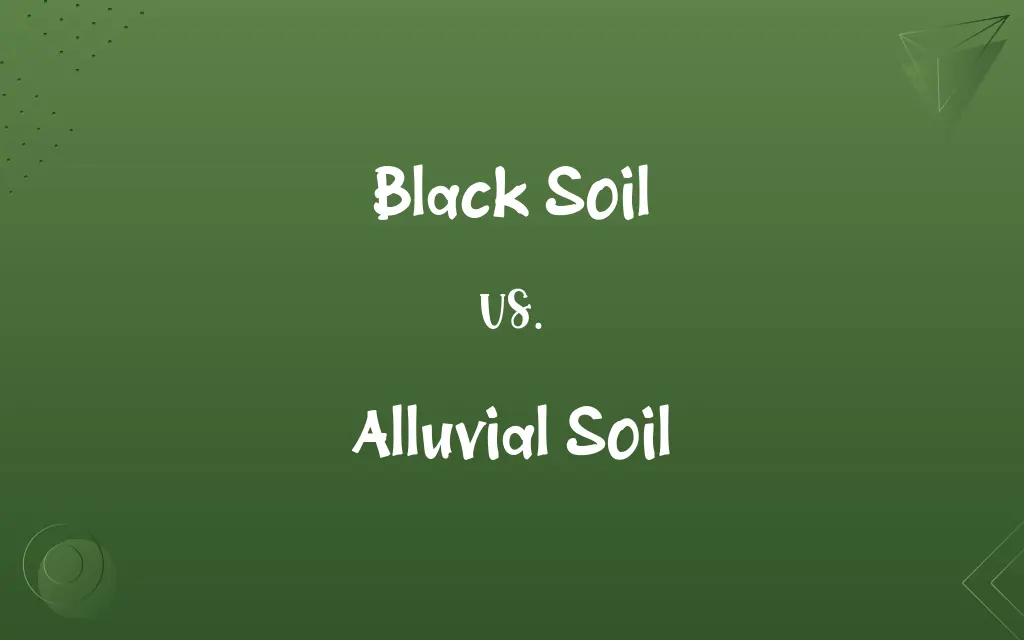Black Soil vs. Alluvial Soil: Know the Difference

By Shumaila Saeed || Published on February 12, 2024
Black soil, rich in iron, magnesium, and aluminum, is ideal for growing cotton, while alluvial soil, formed by river sediments, is fertile and suitable for a variety of crops.

Key Differences
Black Soil, also known as Regur soil, is characterized by its high iron content and dark color. In contrast, Alluvial Soil is typically light-colored and known for its high fertility due to the rich mineral deposits left by rivers.
Shumaila Saeed
Feb 12, 2024
Formed from volcanic rocks and lava, Black Soil is renowned for its ability to hold moisture. Alluvial Soil, on the other hand, is formed by sediment deposited by rivers, making it rich in nutrients and good for agriculture.
Shumaila Saeed
Feb 12, 2024
Black Soil is ideal for growing cotton and is often found in areas with high temperature and low rainfall. Alluvial Soil is versatile, supporting a wide range of crops like wheat, rice, and sugarcane, and is commonly found in river basins and deltas.
Shumaila Saeed
Feb 12, 2024
The texture of Black Soil varies from clayey to loamy, and it's known for its capacity to swell and shrink. Alluvial Soil, being a mix of sand, silt, and clay, has a loamy texture, making it suitable for intensive agriculture.
Shumaila Saeed
Feb 12, 2024
Black Soil requires less fertilizer due to its high mineral content, whereas Alluvial Soil, despite being fertile, often benefits from fertilization to maintain its nutrient level, especially in areas of intensive farming.
Shumaila Saeed
Feb 12, 2024
ADVERTISEMENT
Comparison Chart
Texture
Clayey to loamy, can swell and shrink
Mix of sand, silt, and clay, generally loamy
Shumaila Saeed
Feb 12, 2024
Best for Growing
Cotton, oilseeds, and pulses
A wide range of crops including grains and fruits
Shumaila Saeed
Feb 12, 2024
Geographic Presence
Deccan plateau, Central and Western India
River basins and deltas, especially in Northern India
Shumaila Saeed
Feb 12, 2024
ADVERTISEMENT
Black Soil and Alluvial Soil Definitions
Black Soil
Known for its dark color, Black Soil is fertile and clayey.
The farmers value the black soil for its suitability for growing pulses.
Shumaila Saeed
Jan 19, 2024
Alluvial Soil
Alluvial Soil is replenished annually by river floods.
Yearly flooding ensures the alluvial soil remains nutrient-rich and productive.
Shumaila Saeed
Jan 19, 2024
Black Soil
Black Soil is rich in minerals and has a high capacity to retain moisture.
The black soil in the region is ideal for cultivating high-quality cotton.
Shumaila Saeed
Jan 19, 2024
Alluvial Soil
Rich in nutrients, Alluvial Soil is suitable for various crops.
Farmers prefer alluvial soil for its versatility in growing both grains and fruits.
Shumaila Saeed
Jan 19, 2024
Black Soil
Originating from volcanic activity, Black Soil is rich in iron and potassium.
The black soil's richness in iron contributes to its distinct dark color.
Shumaila Saeed
Jan 19, 2024
ADVERTISEMENT
Alluvial Soil
Alluvial Soil is often sandy to silty in texture.
The sandy texture of alluvial soil makes it easy to cultivate and irrigate.
Shumaila Saeed
Jan 19, 2024
Black Soil
Black Soil expands when wet and contracts when dry.
The characteristic shrinking and swelling of black soil aids in self-plowing.
Shumaila Saeed
Jan 19, 2024
Alluvial Soil
Alluvial Soil, formed by river sediments, is highly fertile.
The alluvial soil along the riverbanks is excellent for vegetable farming.
Shumaila Saeed
Jan 19, 2024
Black Soil
Black Soil is particularly well-suited for dry farming regions.
Despite the arid climate, the black soil supports robust crop growth.
Shumaila Saeed
Jan 19, 2024
Alluvial Soil
Alluvial Soil is typically found in river deltas and floodplains.
The extensive alluvial soil in the delta region supports diverse agriculture.
Shumaila Saeed
Jan 19, 2024
Repeatedly Asked Queries
What is Alluvial Soil?
Alluvial Soil is fertile soil formed by river sediments, suitable for a wide range of crops.
Shumaila Saeed
Feb 12, 2024
What makes Black Soil unique?
Black Soil is unique due to its ability to retain moisture and its suitability for growing cotton.
Shumaila Saeed
Feb 12, 2024
Can Black Soil support diverse agriculture?
Black Soil is best suited for specific crops like cotton, oilseeds, and pulses rather than diverse agriculture.
Shumaila Saeed
Feb 12, 2024
Does Alluvial Soil require a lot of fertilization?
Although fertile, Alluvial Soil may require fertilization to maintain nutrient levels, especially in intensive farming.
Shumaila Saeed
Feb 12, 2024
Which regions are known for Alluvial Soil?
Alluvial Soil is typically found in river basins and deltas, especially in Northern India.
Shumaila Saeed
Feb 12, 2024
How does Black Soil's origin affect its properties?
Black Soil's origin from volcanic rocks contributes to its rich mineral content and moisture retention capabilities.
Shumaila Saeed
Feb 12, 2024
Where is Black Soil commonly found?
Black Soil is commonly found in the Deccan plateau and parts of Central and Western India.
Shumaila Saeed
Feb 12, 2024
Why is Alluvial Soil considered fertile?
Alluvial Soil is considered highly fertile due to the rich nutrients deposited by river waters.
Shumaila Saeed
Feb 12, 2024
What are the main minerals found in Black Soil?
Black Soil is rich in minerals like iron, calcium, and potassium.
Shumaila Saeed
Feb 12, 2024
What is Black Soil?
Black Soil is a type of soil rich in minerals, known for its dark color and high moisture retention.
Shumaila Saeed
Feb 12, 2024
What is the impact of river floods on Alluvial Soil?
River floods replenish Alluvial Soil with nutrients, making it perpetually fertile.
Shumaila Saeed
Feb 12, 2024
Is Black Soil easy to cultivate?
Cultivating Black Soil can be challenging due to its tendency to become hard when dry.
Shumaila Saeed
Feb 12, 2024
What type of crops are best grown in Alluvial Soil?
Alluvial Soil is versatile and can support a variety of crops including grains, fruits, and vegetables.
Shumaila Saeed
Feb 12, 2024
Can Black Soil be found outside India?
Similar types of Black Soil can be found in other parts of the world, especially in regions with volcanic activity.
Shumaila Saeed
Feb 12, 2024
Are there different types of Alluvial Soil?
Yes, Alluvial Soil can vary from sandy to silty, depending on the river's course and the region.
Shumaila Saeed
Feb 12, 2024
How does the texture of Black Soil affect farming?
The clayey texture of Black Soil, which allows it to swell and shrink, is beneficial for retaining moisture and nutrients.
Shumaila Saeed
Feb 12, 2024
Why is Alluvial Soil preferred for crop rotation?
The nutrient-rich nature of Alluvial Soil makes it ideal for crop rotation, supporting various crops sequentially.
Shumaila Saeed
Feb 12, 2024
How does the texture of Alluvial Soil benefit crops?
The loamy texture of Alluvial Soil, a mix of sand, silt, and clay, provides good drainage and aeration for crops.
Shumaila Saeed
Feb 12, 2024
Is Alluvial Soil good for intensive agriculture?
Yes, the loamy texture of Alluvial Soil makes it ideal for intensive agriculture.
Shumaila Saeed
Feb 12, 2024
What farming practices suit Black Soil?
Black Soil is well-suited for dry farming practices due to its moisture retention properties.
Shumaila Saeed
Feb 12, 2024
Share this page
Link for your blog / website
HTML
Link to share via messenger
About Author
Written by
Shumaila SaeedShumaila Saeed, an expert content creator with 6 years of experience, specializes in distilling complex topics into easily digestible comparisons, shining a light on the nuances that both inform and educate readers with clarity and accuracy.








































































